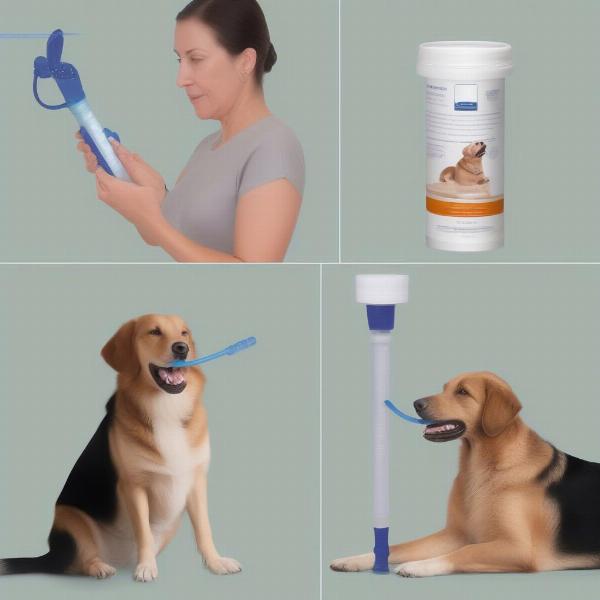Laxatone is a popular over-the-counter remedy for occasional constipation in dogs. This article will delve into the uses, benefits, and potential risks of Laxatone, providing you with the information you need to make informed decisions about your dog’s digestive health. We’ll cover everything from understanding the causes of constipation in dogs to administering Laxatone safely and effectively.
Constipation in dogs can be caused by a variety of factors, including diet, lack of exercise, certain medications, and underlying health conditions. While Laxatone can offer relief, it’s essential to understand when and how to use it correctly. This guide will address common concerns and provide practical advice for managing your dog’s constipation with Laxatone. We’ll also explore alternative methods for promoting regular bowel movements and when it’s crucial to seek veterinary care.
Understanding Canine Constipation
Before reaching for Laxatone, it’s important to understand what constitutes constipation in dogs. Infrequent bowel movements, straining to defecate, and hard, dry stools are common signs. However, each dog is different, and what’s normal for one might not be for another. Observing your dog’s regular bowel habits is key to recognizing any changes.
Common Causes of Constipation in Dogs
Several factors can contribute to constipation in dogs, including:
- Diet: A lack of fiber in your dog’s diet can make it difficult for waste to move through the digestive tract.
- Dehydration: Insufficient water intake can lead to hard, dry stools.
- Lack of Exercise: Regular physical activity helps stimulate bowel movements.
- Medications: Some medications can have constipation as a side effect.
- Underlying Health Conditions: Certain medical conditions, such as hypothyroidism and megacolon, can cause chronic constipation.
What is Laxatone and How Does it Work?
Laxatone is a lubricant laxative specifically formulated for pets. It contains petrolatum, a petroleum-based lubricant that coats the stool, making it easier to pass through the digestive tract. This helps alleviate constipation by softening the stool and facilitating its movement.
Administering Laxatone to Your Dog
Laxatone is typically administered orally. You can either squeeze a small amount onto your dog’s paw or directly into their mouth. Follow the dosage instructions provided on the product packaging carefully. It’s always best to start with the lowest recommended dose and increase it gradually if needed.
 Giving Laxatone to a Dog
Giving Laxatone to a Dog
When to Seek Veterinary Care
While Laxatone can be effective for occasional constipation, it’s essential to consult your veterinarian if your dog’s constipation is persistent or severe. Chronic constipation can be a sign of a more serious underlying health issue. Your veterinarian can diagnose the cause and recommend appropriate treatment. Also, seek immediate veterinary attention if your dog exhibits signs of pain, vomiting, or lethargy along with constipation.
Alternatives to Laxatone
Several alternatives to Laxatone can help promote regular bowel movements in dogs:
- Increased Fiber Intake: Adding fiber-rich foods like pumpkin or sweet potato to your dog’s diet can help bulk up the stool and make it easier to pass.
- Increased Water Intake: Ensuring your dog has access to fresh water throughout the day is crucial for preventing dehydration and promoting healthy bowel movements.
- Regular Exercise: Daily walks and playtime can help stimulate the digestive system.
“Ensuring your dog has access to plenty of fresh water is often the first step in addressing mild constipation,” says Dr. Emily Carter, DVM. “This, combined with an increase in dietary fiber, can often resolve the issue without the need for medication.”
Conclusion
Laxatone can be a helpful tool for managing occasional constipation in dogs. However, it’s crucial to use it responsibly and consult with your veterinarian if the problem persists. Prioritizing a balanced diet, adequate hydration, and regular exercise are key to maintaining your dog’s digestive health. By understanding the causes of constipation and utilizing appropriate remedies, you can help your furry friend stay comfortable and healthy.
FAQ
- How often can I give my dog Laxatone? Follow the instructions on the packaging. Typically, Laxatone is given once or twice daily.
- Can Laxatone be given long-term? It’s best to use Laxatone for short-term relief. Consult your veterinarian for chronic constipation.
- What are the side effects of Laxatone? Side effects are rare but can include vomiting and diarrhea.
- Can puppies take Laxatone? Consult your veterinarian before giving Laxatone to a puppy.
- What should I do if my dog doesn’t poop after taking Laxatone? Contact your veterinarian if you don’t see improvement within 24 hours.
- Can I mix Laxatone with my dog’s food? Yes, you can mix Laxatone with a small amount of food.
- Is Laxatone safe for pregnant dogs? Consult your veterinarian before giving Laxatone to a pregnant dog.
ILM Dog is a leading online resource for dog owners worldwide. We offer expert advice on dog breeds, health, training, nutrition, grooming, and much more. From puppy care to senior dog support, we cover all aspects of responsible dog ownership. For expert advice on your dog’s health, contact us at [email protected] or call +44 20-3965-8624. Visit ILM Dog for more information on dog care and to explore our range of products and services.